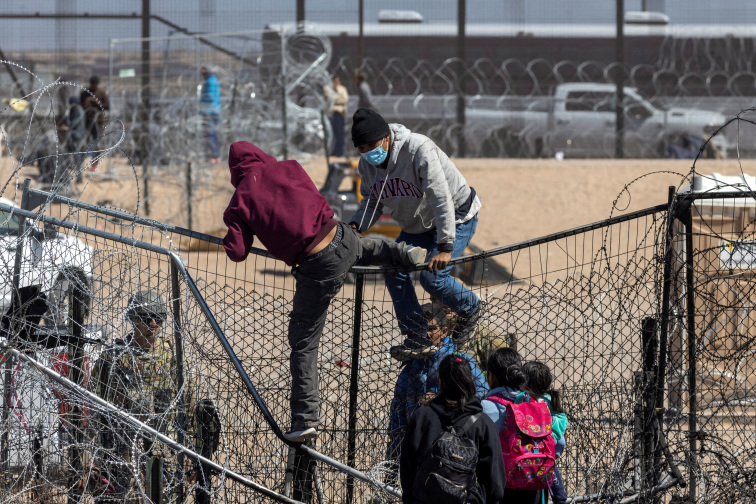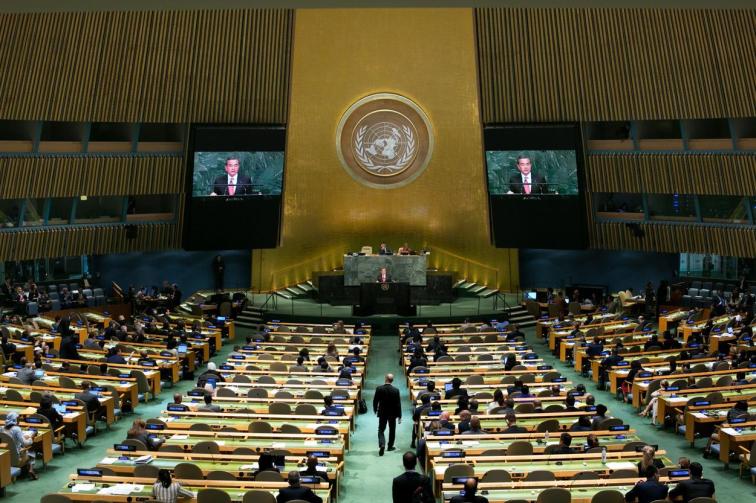Image: A Chinese military canine and demolition unit conducting a security sweep at Tiananmen Square. (Photo by Kevin Frayer/Getty Images)
[People News] Yesterday, rumors suddenly spread online that Zhong Shaojun, former director of the General Office of the Central Military Commission (CMC) and a close confidant of Xi Jinping, is under investigation. The news broke amid a series of high-profile incidents, including the investigation of Miao Hua, reports of Lin Xiangyang's alleged suicide, rumors of Dong Jun being summoned for "tea sessions," and claims of Cai Qi's son being involved in a car accident. Given the timing, the news naturally caused quite a stir. Prominent blogger "Old Lantern" reported that Zhong Shaojun has been officially placed under investigation by both the Central Commission for Discipline Inspection (CCDI) and the military's disciplinary commission. The primary reason is said to involve massive bribes that Miao Hua received during the promotion of military officers, a significant portion of which was allegedly funneled to Zhong Shaojun.
The "Zhang Leading the Investigation" Theory
Prominent blogger "Old Lantern" claimed that Zhong Shaojun, after leaving his post at the General Office of the Central Military Commission (CMC), did not assume the role of political commissar at the National Defense University. Instead, according to the source, Zhong has been under investigation, led by Zhang Youxia.
However, there has been no official confirmation from within China, and no relevant information has surfaced in domestic channels, making it impossible to verify these claims with CCP authorities at this time.
According to Wikipedia, Zhong Shaojun (born October 19, 1968) held multiple key positions within the CMC, including Director of the General Office, Director of the Office of the Chairman of the CMC, and Director of the CMC Office for Reform and Organizational Structure. He also served as Director of the Office of the Leading Group for Deepening National Defense and Military Reforms under the CMC and as a member of the PLA Election Committee. Zhong is widely considered Xi Jinping’s "chief of staff" within the military and is a member of the 20th Central Committee of the CCP.
The profile describes Zhong as Xi’s long-time trusted aide during his tenures in Zhejiang, Shanghai, and the central government. Zhong previously served as Deputy Minister of the Zhejiang Provincial Party Committee's Organization Department and Deputy Director of the Shanghai Municipal Party Committee's General Office in 2007. Following Xi’s elevation to the Politburo Standing Committee, Zhong accompanied him to Beijing and took on the role of Political Group Leader in the General Office of the Central Committee's Research Office. In June 2013, despite having no military experience, Zhong was parachuted into the CMC General Office as Deputy Director and Director of the Chairman’s Office, where he aided Xi in taking down high-ranking officers Xu Caihou and Guo Boxiong. By August 2017, he became Director of the CMC General Office. Zhong has been a delegate and presidium member at the 19th Party Congress and was considered a critical figure in enforcing Xi’s directives within the military, earning a reputation as Xi’s monitor in the PLA and a core influencer in military matters.
Political observer and media commentator Li Muyang remarked that if the rumors about Zhong Shaojun’s investigation are true, it would signify that Xi Jinping’s influence within the military has become negligible. "Zhang’s blade is drawing closer," he noted, referring to Zhang Youxia’s alleged role in spearheading the investigation and challenging Xi’s authority in the military.
Allegations of Political Disloyalty
Renowned Australia-based legal scholar Professor Yuan Hongbing offers a different perspective. Citing an insider with conscience from within the CCP system, Yuan argues that the arrest of Miao Hua is neither a case of Zhang Youxia targeting Xi’s loyalists nor a true anti-corruption effort by Xi. Instead, Miao’s downfall stems from political disloyalty and represents the second act of fierce internal infighting among factions within Xi’s camp. According to Yuan, after 12 years of purging and consolidating power, Xi Jinping has established an efficient personal dictatorship. This includes stringent surveillance of military and local officials, including Zhang Youxia and Miao Hua, who are among Xi’s handpicked loyalists. These officials owe their positions to Xi’s favor and exist at his discretion. Yuan points out that Xi faces a severe political crisis because many of these officials are "two-faced individuals" who lack genuine loyalty.
Yuan Hongbing relayed information from a member of the CCP’s princeling families, revealing that Miao Hua had privately told Wang Houbin and Dong Jun: "The boss [Xi Jinping] says we are facing unprecedented changes unseen in a century, so we each need to prepare ourselves for these changes. As individuals, we are fragile, but by forming strong alliances, we can strengthen ourselves to face the upheaval." "When we accept thank-you payments while promoting subordinates, it’s not about selling positions or making money. It’s about building alliances tied together by shared interests. Relationships built on mutual interests are the most reliable. Of course, the payments shouldn’t be too high to avoid damaging relationships." Miao is accused of fostering factionalism within the military by promoting officers based on such "interest-driven alliances."
Insiders also claim that the first act of intense internal conflict, which led to the downfall of Li Shangfu, Wei Fenghe, and Rocket Force leadership, was initiated by Miao Hua. He Hongjun, the only officer promoted to general before the Third Plenum in 2023 and deputy director of the Political Work Department, reportedly bypassed the chain of command and directly reported Miao Hua’s political disloyalty and bribery to Xi Jinping three times between November 2023 and February 2024. Xi personally approved a secret investigation into Miao, led by Zhang Youxia and managed by He Hongjun. Zhang swiftly contacted Rocket Force Commander Wang Houbin and Defense Minister Dong Jun to investigate Miao. Both, who had been promoted and backed by Miao, turned on him to protect themselves, exposing Miao’s political disloyalty and corruption.
Wang and Dong revealed that Miao advocated for urging Xi to accelerate military action against Taiwan, saying: "Without war, military power remains monopolized by the boss. No matter how high we climb, we’re still just workers. But once war begins, senior generals can truly hold real power. Acting on Taiwan sooner gives us the leverage to make strategic choices. At that point, we wouldn’t have to tie our fates to Xi indefinitely. After all, the boss can be unpredictable and difficult to please." This information, along with Miao’s other alleged offenses, was reportedly distributed in formal internal documents to senior military officers (above corps level) and provincial-level party and government officials, about a week before the Ministry of Defense formally announced Miao’s investigation.
Based on Yuan’s account, if Zhong Shaojun is indeed in trouble, it is likely due to involvement in Miao Hua’s disloyalty case. Otherwise, there would be no reason for Xi to personally authorize Zhong’s arrest. This suggests that Zhong’s fall, if true, may stem from the broader internal conflicts and factional struggles within Xi’s tightly controlled system.
Conclusion
Regardless of whether it’s the views of Old Lantern and Li Muyang, or those of Yuan Hongbing and the princeling family insider, one thing seems certain: Xi Jinping has no one left to trust. The brutal infighting and mutual destruction within Xi’s faction also appear to be real. Xi’s disillusionment with the CCP, the CMC, and the personnel in Zhongnanhai is likely genuine. It also seems true that Xi is physically and mentally exhausted, burdened by the "200 pounds of sin" left behind by Jiang Zemin while trying to "save the Party."
Ultimately, whether Zhong Shaojun is under investigation or not is less important. The CCP’s opaque, black-box system makes it impossible for the public to fully grasp the true nature of its internal power struggles. However, what truly matters is that these internal battles continue to expose the inherent evil of this illegitimate regime, helping the world recognize it for what it is and stay away from it. Even if the rumors are untrue, their popularity reflects a broader sentiment: a deep public loathing for the CCP and a widespread hope for its eventual demise.











News magazine bootstrap themes!
I like this themes, fast loading and look profesional
Thank you Carlos!
You're welcome!
Please support me with give positive rating!
Yes Sure!